
Jean Maurice Eugène Clément Cocteau was a French poet, playwright, novelist, designer, filmmaker, visual artist and critic.

Philip Glass is an American composer and pianist. He is widely regarded as one of the most influential composers of the late 20th century. Glass's work has been associated with minimalism, being built up from repetitive phrases and shifting layers. Glass describes himself as a composer of "music with repetitive structures", which he has helped evolve stylistically.
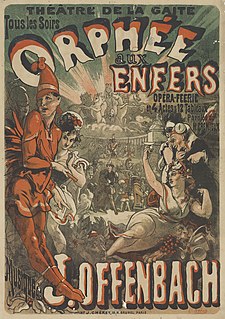
Orpheus in the Underworld and Orpheus in Hell are English names for Orphée aux enfers, a comic opera with music by Jacques Offenbach and words by Hector Crémieux and Ludovic Halévy. It was first performed as a two-act "opéra bouffon" at the Théâtre des Bouffes-Parisiens, Paris, on 21 October 1858, and was extensively revised and expanded in a four-act "opéra féerie" version, presented at the Théâtre de la Gaîté, Paris, on 7 February 1874.

Orpheus is a 1950 French film directed by Jean Cocteau and starring Jean Marais. It is the central part of Cocteau's Orphic Trilogy, which consists of The Blood of a Poet (1930), Orpheus (1950), and Testament of Orpheus (1960).
The Philip Glass Ensemble is an American musical group founded by composer Philip Glass in 1968 to serve as a performance outlet for his experimental minimalist music. The ensemble continues to perform and record to this day, under the musical direction of keyboardist Michael Riesman.
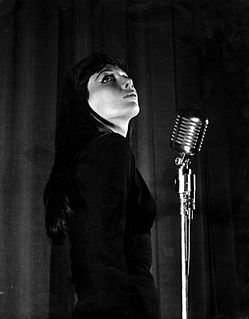
Juliette Gréco was a French singer and actress. Her best known songs are "Jolie Môme", "Déshabillez-moi" and "La Javanaise". She often sang tracks with lyrics written by French poets such as Jacques Prévert and Boris Vian, as well as singers like Jacques Brel and Serge Gainsbourg. Her sixty-year career finished in 2015 when she began her last worldwide tour titled "Merci".
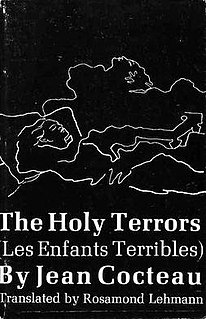
Les Enfants Terribles is a 1929 novel by Jean Cocteau, published by Editions Bernard Grasset. It concerns two siblings, Elisabeth and Paul, who isolate themselves from the world as they grow up, an isolation which is shattered by the stresses of their adolescence. It was first translated into English by Samuel Putnam in 1930 and published by Brewer & Warren Inc. A later English translation was made by Rosamond Lehmann in 1955, and published by New Directions (ISBN 0811200213) in the U.S., and Mclelland & Stewart in Canada in 1966, with the title translated as The Holy Terrors. The book is illustrated by the author's own drawings.

The Blood of a Poet (1930) is an avant-garde film directed by Jean Cocteau, financed by Charles de Noailles and starring Enrique Riveros, a Chilean actor who had a successful career in European films. Photographer Lee Miller made her only film appearance in this movie, which features an appearance by the famed aerialist Barbette. It is the first part of The Orphic Trilogy, which is continued in Orphée (1950) and concludes with Testament of Orpheus (1960).
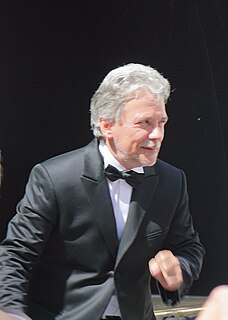
Jean-Paul Fouchécourt is a French tenor, mostly as an opera singer. He was born on 30 August 1958 at Blanzy in the Burgundy region. He is best known for singing French Baroque music, especially the parts called in French haute-contre, written for a very high tenor voice with no falsetto singing.
Laurent Pelly is a French opera and theatre director born in Paris in 1962. He enjoys a career as one of France's most sought after directors of both theatre and opera, working regularly in the world’s most prestigious houses.

María Casares was a Spanish-French actress and one of the most distinguished stars of the French stage and cinema. She was credited in France as Maria Casarès.

Les Enfants Terribles is a 1950 French film directed by Jean-Pierre Melville and based on Jean Cocteau's novel, Les Enfants Terribles. The first feature film of Melville, Le Silence de la Mer (1949), attracted the attention of Jean Cocteau, who commissioned him to direct the film version of Les Enfants Terribles.

Jean Hugo was a painter, illustrator, theatre designer and author. He was born in Paris and died in his home at the Mas de Fourques, near Lunel, France. Brought up in a lively artistic environment, he began teaching himself drawing and painting and wrote essays and poetry from a very early age. His artistic career spans the 20th century, from his early sketches of the First World War, through the creative ferment of the Parisian interwar years, and up to his death in 1984. He was part of a number of artistic circles that included Jean Cocteau, Raymond Radiguet, Pablo Picasso, Georges Auric, Erik Satie, Blaise Cendrars, Marie-Laure de Noailles, Paul Eluard, Francis Poulenc, Charles Dullin, Louis Jouvet, Colette, Marcel Proust, Jacques Maritain, Max Jacob, Carl Theodor Dreyer, Marie Bell, Louise de Vilmorin, Cecil Beaton and many others.
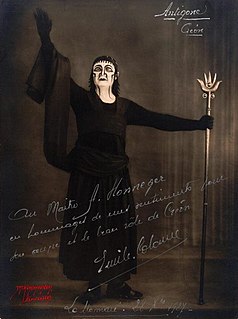
Antigone is an opera in three acts by Arthur Honegger to a French libretto by Jean Cocteau based on the tragedy Antigone by Sophocles. Honegger composed the opera between 1924 and 1927. It premiered on 28 December 1927 at the Théâtre Royal de la Monnaie with sets designed by Pablo Picasso and costumes by Coco Chanel.
Yves-André Hubert is a French actor, television film director and theatre metteur en scène. He received a Sept d'or award in 1988 for L'Affaire Marie Besnard.

Jean-François Gardeil is a French baritone and theatre director. He is also the founder and artistic director of the Chants de Garonne.

La Belle et la Bête is an opera for ensemble and film, composed in 1994 by Philip Glass based on a libretto in French by the composer according to the script of the film by Jean Cocteau released in 1946. This is the second part of a trilogy in homage to the French poet after Orphée (1993) and before Les Enfants Terribles (1996). The world premiere of the work took place on 4 June 1994 in Seville, with Michael Riesman conducting.

Orphée is a chamber opera in two acts and 18 scenes, for ensemble and soloists, composed in 1991 by Philip Glass, to a libretto by the composer, based on the scenario of the eponymous film (1950) by Jean Cocteau. Commissioned by the American Repertory Theater in Cambridge, Massachusetts, and the Brooklyn Academy of Music in New York, this is the first part of a trilogy in honour of the French poet. The world premiere of the work took place on 14 May 1993 under the direction of Martin Goldray and the European premiere in London on 27 May 2005 in the Royal Opera House's Linbury Studio Theatre.














